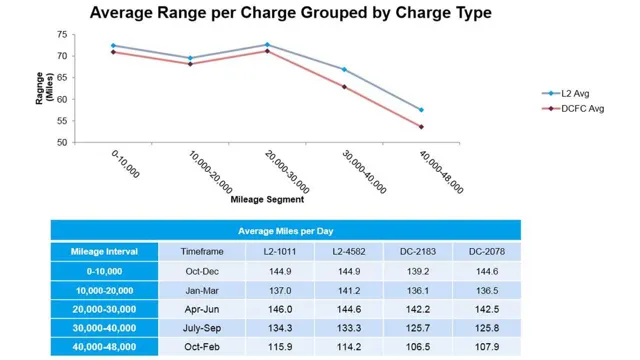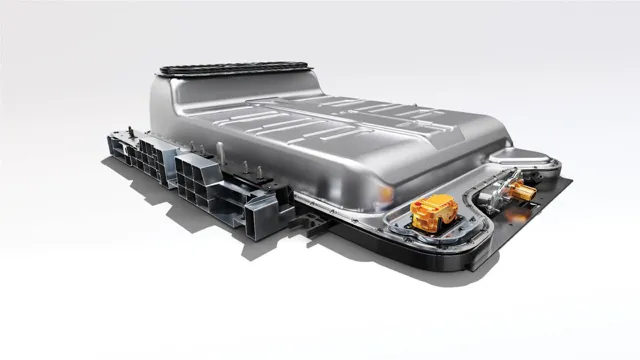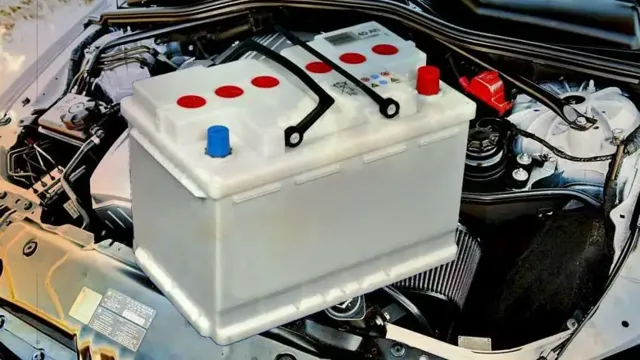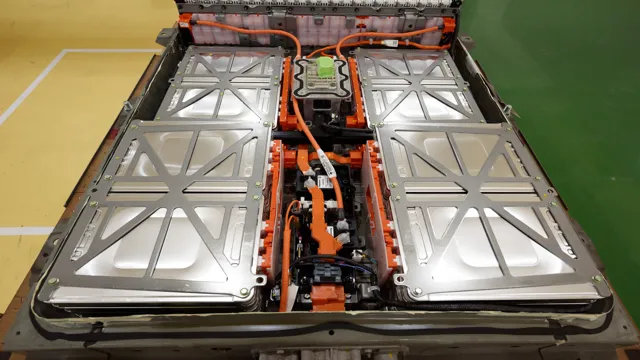The Power Of Electric Cars: Unlocking The Longevity Of Their Batteries
Electric cars are becoming increasingly popular as more people look for eco-friendly options for their daily commutes. However, one concern that potential electric car owners may have is battery life. Electric car batteries are typically more expensive to replace than traditional car batteries, which can leave some worried about the long-term costs of owning an electric car.
But fear not! By following some simple tips and tricks, you can maximize your electric car battery life and enjoy a worry-free driving experience for years to come. First and foremost, it’s essential to keep your electric car battery charged within the recommended range. Overcharging or undercharging your battery can significantly reduce its lifespan, so it’s crucial to follow the manufacturer’s guidelines.
Additionally, reducing unnecessary weight in your electric car can also help to prolong battery life. As tempting as it may be to use your electric car as a storage space, try to keep it as light as possible by removing any excess cargo. Another way to maximize your electric car battery life is to avoid fast charging whenever possible.
While fast charging is a convenient way to top up your battery quickly, it can also put extra strain on your battery and reduce its lifespan over time. Instead, try to stick to slower, more gradual charging options whenever possible. Not only will this help to prolong your battery’s life, but it can also be more cost-effective in the long run.
In conclusion, maximizing your electric car battery life may require a few changes to your driving habits, but the benefits are well worth it. By keeping your battery charged within the recommended range, reducing excess weight, and avoiding fast charging, you can enjoy a worry-free driving experience for years to come. So why not make the switch to an electric car and help to reduce your carbon footprint today?
Factors Affecting Battery Longevity
Electric car battery longevity is influenced by several factors. The type of battery, how often it’s charged, and the temperature it operates in can all affect how long the battery lasts. Lithium-ion batteries are commonly used in electric cars because they have a longer lifespan than other battery types.
Additionally, how often the battery is charged impacts how long it lasts. Frequent charging can cause wear and tear on the battery, shortening its lifespan. Temperature also has a significant impact on battery longevity.
Extreme cold or heat can cause the battery to degrade faster, ultimately reducing its lifespan. As electric cars become more popular, advancements in battery technology and charging infrastructure will likely improve battery longevity.
Environmental Conditions
Environmental conditions have a significant impact on the longevity of batteries, whether they are used in cars, phones, or other devices. The temperature at which a battery operates is a crucial factor that can determine the life of the battery. Extreme hot or cold environments can cause a battery to discharge more quickly than usual, affecting its overall lifespan.
Similarly, high levels of humidity can lead to corrosion and damage to the battery’s components. Another environmental condition that affects battery longevity is air pressure, particularly when batteries are used in high-altitude regions. In such conditions, the lower oxygen levels can affect the battery’s performance and lifespan.
As such, it is essential to consider the environment in which batteries are used and stored to ensure their maximum longevity. Proper storage and use can help prolong a battery’s lifespan and reduce the need for frequent replacements.
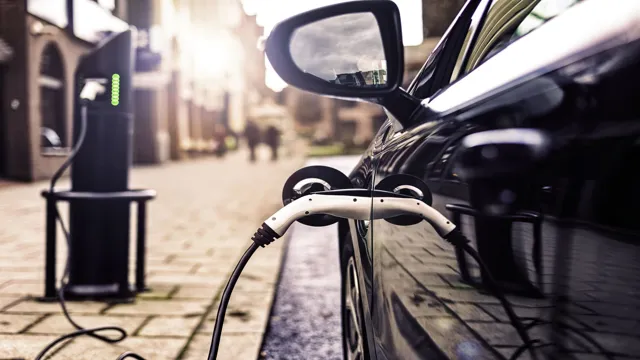
Driving Habits
When it comes to driving habits, there are numerous factors that can affect the longevity of your car’s battery. One of the most significant factors is the frequency and duration of your driving. Short trips, especially in cold weather, can drain the battery quickly and cause it to wear out faster over time.
This is because the engine doesn’t have enough time to fully recharge the battery during these short trips. Another habit that can negatively impact your battery is leaving your car’s lights or other electronics on while the engine is off. This can drain the battery and cause it to wear out prematurely as well.
To ensure the longevity of your battery, it’s best to drive for longer periods and avoid overusing your car’s electronics. Additionally, getting your battery checked and serviced regularly can help ensure its optimal performance and prevent unexpected breakdowns on the road. By developing good driving habits and taking good care of your battery, you can ensure that it lasts as long as possible, saving you money on repairs and replacements in the long run.
Recommended Battery Maintenance Tips
Electric cars are becoming increasingly popular due to their environmental benefits. However, the longevity of the battery remains a major concern for many car owners. To ensure electric car battery longevity, it is essential to practice good battery maintenance.
One useful tip is to keep the battery charged between 20 and 80 percent to prevent overcharging or deep discharge, which can damage the battery. Charging the battery regularly is vital, particularly if the vehicle is not used often. Regular servicing and maintenance can also extend the life of the battery.
It’s also important to avoid extreme temperatures, as both extremely high and low temperatures can damage the battery. With proper battery maintenance, electric car owners can extend the longevity of their battery and enjoy a longer driving range while reducing their carbon footprint.
Regular Charging
When it comes to maintaining your battery’s health, regular charging is key. It’s important to keep your battery consistently charged to prevent it from completely draining, which can ultimately cause irreversible damage. Think of it like charging your own body – you can’t expect to perform at your best if you’re constantly running on low energy levels.
The same goes for your battery. Make sure to charge it before it reaches a low level, ideally keeping it at around 50% to 80% charge. Additionally, avoid exposing your battery to extreme temperatures, as this can also cause damage.
By following these simple maintenance tips, you can ensure that your battery stays healthy and performs optimally for years to come.
Monitoring Charge Levels
Monitoring battery charge levels is important to maintain the longevity and performance of your battery. One recommended tip to ensure proper battery maintenance is to regularly check the charge levels and keep them between 50-80%. When the battery charge drops below 50%, it puts more strain on the battery and reduces its lifespan.
On the other hand, charging the battery to 100% all the time can also lead to reduced battery capacity over time. Using analogies, you can compare it to a marathon runner who cannot constantly sprint without burning out. It’s important to maintain a consistent and healthy level of energy to keep going.
Similarly, keeping your battery at a healthy charge level can help it last longer and perform better. With these simple tips, you can ensure that your battery stays healthy and optimizes its performance for the long run.
Scheduled Maintenance
Scheduled Maintenance One of the most important aspects of vehicle maintenance is taking care of the battery. Proper maintenance ensures that the battery lasts as long as possible and doesn’t leave you stranded on the side of the road. One important tip is to keep the battery clean.
Dirt and corrosion can build upon the terminals and lead to poor connections. Clean the terminals regularly with a mixture of baking soda and water. Always remember to wear gloves and eye protection to protect your skin and eyes from battery acid.
Also, make sure the battery is properly secured and does not move around while driving. A loose battery can cause damage to the terminals and the car’s wiring. Lastly, check the battery’s charge regularly and keep it at a proper level.
A low battery charge can cause damage and reduce its lifespan. By following these simple tips, you can ensure that your battery is properly maintained and lasts as long as possible, saving you time and money in the long run.
How to Extend Battery Life
As electric cars continue to grow in popularity, one of the biggest concerns among drivers is the longevity of the car’s battery. So, how can you extend the battery life of your electric vehicle? One simple way is to limit the amount of time you spend fast charging your battery. Although it may be tempting to quickly recharge your battery at a fast-charging station, doing so it too frequently can put extra strain on the battery and shorten its lifespan.
Instead, try to charge your battery at a slower rate whenever possible. Additionally, try to keep your battery between 20% and 80% charged, as constantly charging it to 100% or allowing it to fully drain can also reduce its lifespan. By taking these simple steps, you can ensure that your electric car’s battery lasts for many years to come, all while enjoying the benefits of eco-friendly driving.
Avoid Fast Charging
One of the best ways to extend the life of your phone’s battery is to avoid fast charging. While it may be tempting to quickly charge up your device, especially when you’re on the go, doing so can actually decrease the overall lifespan of your battery. Fast charging puts a lot of stress on your battery, which can lead to a decrease in its capacity over time.
Instead of fast charging, try using a slower, more traditional charger when you have the time to spare. This will help to maintain the health of your battery, and give you a longer lifespan in the long run. So, next time you’re in a rush, take a deep breath and resist the urge to fast charge, your battery will thank you for it!
Limit Extreme Temperatures
One of the most effective ways to extend your battery life is to limit extreme temperatures. This is because high and low temperatures can take a toll on your device’s battery and cause it to drain faster or even stop working altogether. Therefore, it is important to keep your device at moderate temperatures to ensure its longevity.
To achieve this, you can avoid exposing your device to direct sunlight or extreme cold weather. You can also refrain from charging your device in high-temperature areas such as hot cars. Furthermore, if your device is getting too hot or cold, you can turn it off and let it cool down or warm up before using it again.
By limiting extreme temperatures, you can enjoy a longer-lasting battery life and make the most out of your device. So, take care of your device and let it thrive at moderate temperatures.
Conclusion
In the race towards a more sustainable future, the electric car battery has proven to be a promising contender. While some may argue that the battery’s longevity is a cause for concern, it’s important to note that like any technology, advancements are constantly being made. With each passing year, electric car batteries are becoming more durable, efficient, and reliable.
And while we may not have all the answers just yet, one thing is for certain: the future is electric, and it’s looking brighter every day.”
FAQs
How long does an electric car battery last?
The lifespan of an electric car battery depends on several factors, including the make and model of the vehicle, how it is driven, and how it is maintained. On average, most electric car batteries will last between 8 and 10 years.
Can driving style affect the longevity of an electric car battery?
Yes, driving style can have an impact on the lifespan of an electric car battery. Rapid acceleration, high speeds, and frequent stops can all reduce a battery’s longevity. In contrast, gentle driving and regular maintenance can help extend battery life.
How can I maximize the lifespan of my electric car battery?
To maximize the lifespan of your electric car battery, be sure to follow the manufacturer’s guidelines for charging and maintenance. Avoid letting the battery run down completely, as this can damage the cells. Additionally, keep your car in a cool, dry place when not in use, as excessive heat can degrade the battery over time.
What happens to electric car batteries when they reach the end of their lifespan?
When an electric car battery reaches the end of its useful life, it will need to be replaced. However, many electric car manufacturers offer recycling programs for old batteries. These programs ensure that the valuable materials in the batteries, such as lithium and cobalt, are recovered and reused, reducing waste and environmental impact.
